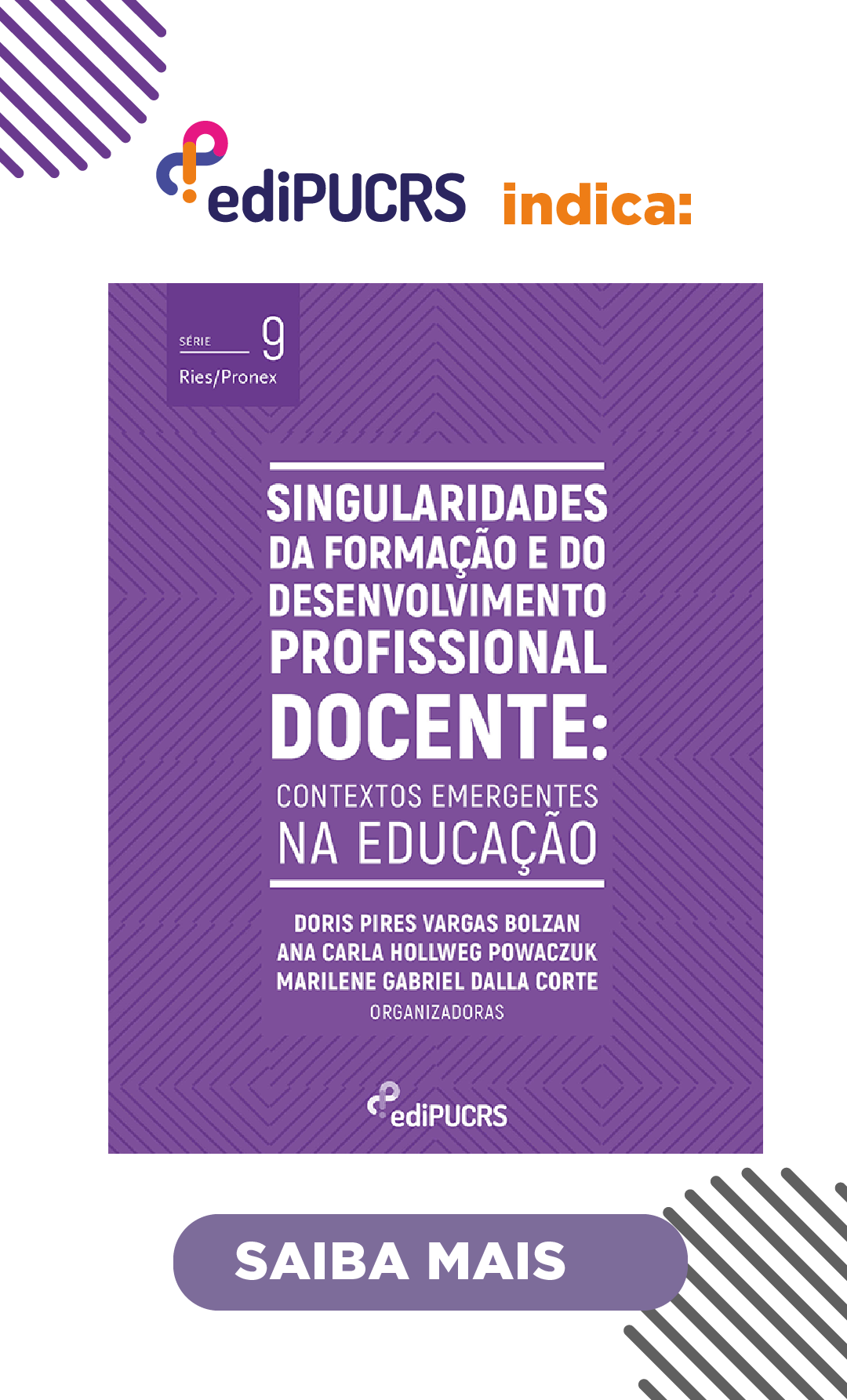Ethnic-racial relations
what does the teaching material in the new high school cover?
DOI:
https://doi.org/10.15448/2179-8435.2024.1.45316Keywords:
Education for Ethnic-Racial Relations, New High School, Textbook, Decolonial.Abstract
Teaching education for ethnic-racial relations in basic education can promote acceptance, positive identities and contribute to the fight against silencing, prejudice and racism. Furthermore, presence and dialogue on race
relations help us to have a more egalitarian and democratic society, since there is no ‘democracy with racism’. The objective of this text is to analyze the presence of education for ethnic-racial relations in images and texts with reference to history, Afro-Brazilian and indigenous culture in teaching materials in the area of Human Sciences made available to students in the Santa Catarina state network in the new high school. The research question that guides us is: how are themes relating to these themes through images and texts addressed in the teaching materials available for the new secondary education? The source of analysis is the textbook Moderna em Projetos: Ciências Humanas e Sociais Aplicadas (2020). A teaching material that integrates the others distributed and used in public schools in Santa Catarina, and that emphasizes a problem-based learning methodology (PBL). The theoretical-methodological perspective used for analysis is that of decoloniality, an alternative to the modern-western-Christian-colonial reason, which fights against the dehumanization of the Other, especially of afro-descendants and indigenous people in dialogue with bibliographical references that address the theme of racial relations. Preliminary evidence indicates a superficial approach that can give rise to processes of exclusion and racism.
Downloads
References
REFERÊNCIAS
Fonte
DELLORE, Cesar Brumini. Moderna em projetos: ciências humanas e sociais aplicadas. 1ª ed. São Paulo: Moderna, 2020. 208 p. Disponível em: https://pnld.moderna.com.br/colecao/ensino-medio/projetos-integradores/ciencias-humanas-e-sociais-aplicadas/moderna-em-projetos/. Acesso em: 14 jun. 2023.
Bibliográficas
BENTO, Cida. A identidade racial em crianças pequenas. In: BENTO, Maria Aparecida da Silva. Educação infantil, igualdade racial e diversidade: aspectos políticos, jurídicos, conceituais. São Paulo: Centro de Estudos das Relações de Trabalho e Desigualdades ‐ CEERT, 2012. p. 98‐114. Disponível em: www.direito.mppr.mp.br/arquivos/File/educa_infantis_conceituais_.PDF. Acesso em: 11 jun. 2023.
BELANDI, Caio; GOMES, Irene. Censo 2022: pela primeira vez, desde 1991, a maior parte da população do Brasil se declara parda. Agência IBGE Notícias. 22 dez. 2023. Disponível em: https://agenciadenoticias.ibge.gov.br/agencia-noticias/2012-agencia-de-noticias/noticias/38719-censo-2022-pela-primeira-vez-desde-1991-a-maior-parte-da-populacao-do-brasil-se-declara-parda. Acesso em 10 jun. 2024.
BENTO, Cida. O pacto da branquitude. São Paulo: Companhia das Letras, 2022. 152 p.
BRASIL. Ministério da Educação. Base Nacional Comum Curricular. Brasília: MEC: Consed: Undime, abr. 2018. 595 p. Disponível em: http://basenacionalcomum.mec.gov.br/images/BNCC_EI_EF_110518_versaofinal_site.pdf. Acesso em: 18 jun. 2023.
CANDAU, Vera Maria Ferrão. Diferenças Culturais, Interculturalidade e Educação em Direitos Humanos. Educação & Sociedade, Campinas, v. 33, p. 235-250, 2012. Disponível em: https://www.scielo.br/j/es/a/QL9nWPmwbhP8B4QdN8yt5xg/?format=pdf&lang=pt. Acesso em: 25 maio 2023. DOI: https://doi.org/10.1590/S0101-73302012000100015
CASTRO-GÓMEZ, Santiago. Ciências sociais, violência epistêmica e o problema da “invenção do outro”. In: LANDER, Edgardo et al. (org.). A colonialidade do saber: eurocentrismo e ciências sociais: perspectivas latino-americanas. Ciudad Autónoma de Buenos Aires, Argentina, set. 2005. p. 80-87. Disponível em: https://ufrb.edu.br/educacaodocampocfp/images/Edgardo-Lander-org-A-Colonialidade-do-Saber-eurocentrismo-e-ciC3AAncias-sociais-perspectivas-latinoamericanas-LIVRO.pdf Acesso em: 27 jul. 2023.
FERREIRA, Bruno; MENEZES, Magali Mendes de; BERGAMASCHI, Maria Aparecida. Memória e (re) existência: a trajetória intercultural da Ação Saberes Indígenas na Escola. Tellus, Campo Grande, v. 20, n. 43, p. 193-216, set./dez. 2020, 2020. Disponível em: https://www.lume.ufrgs.br/bitstream/handle/10183/220554/001125042.pdf?sequence=1. Acesso em: 1 ago. 2023.
FIGUEIREDO, Eurídice. Elaine Potiguara e Daniel Munduruku: por uma cosmovisão ameríndia. Estudos de Literatura Brasileira Contemporânea, Brasília, n. 53, p. 291-304. jan./abr. 2018. Disponível em: https://doi.org/10.1590/2316-40185312. Acesso em 20 jun. 2023. DOI: https://doi.org/10.1590/2316-40185312
hooks, bell. Olhares Negros: raça e representação. Trad. Stephanie Borges. São Paulo: Elefante, 2019. 356 p. Disponível em: https://cpdel.ifcs.ufrj.br/wp-content/uploads/2020/10/bell-hooks-Olhares-Negros.pdf. Acesso em: 13 jul. 2023.
KILOMBA, Grada. Memórias da plantação: episódios de racismo cotidiano. Rio de Janeiro: Cobogó, 2020. 244 p. Disponível em: https://www.ufrb.edu.br/ppgcom/images/MEMORIAS_DA_PLANTACAO_-_EPISODIOS_DE_RAC_1_GRADA.pdf. Acesso em: 13 jul. 2023.
KRENAK, Ailton. A Potência do Sujeito Coletivo (Parte II). [Entrevista concedida a Jailson de Souza e Silva]. Revista Periferias, Rio de Janeiro, v. 1, n. 1, 2018. Disponível em: https://revistaperiferias.org/materia/ailton-krenak-a-potencia-do-sujeito-coletivo-parte-ii/. Acesso em: 14 jul. 2023.
MOREIRA, Adriano De Lavor. “Ser índio deixou de ser sinônimo de escondido no mato”: uma conversa sobre visibilidade com Ailton Krenak. Revista de Antropologia, São Paulo, v. 65, p. 1-17, 2022. Disponível em: https://www.scielo.br/j/ra/a/x4tv5KtrkT6jSGWKnCLQSpB/?lang=pt#. Acesso em: 14 jul. 2023. DOI: https://doi.org/10.11606/1678-9857.ra.2022.202285
NOGUEIRA, Sidnei. Intolerância religiosa. São Paulo: Pólen, 2020. 160 p. Disponível em: https://files.cercomp.ufg.br/weby/up/1154/o/Intolerancia_Religiosa_Feminismos_Plurais_Sidnei_Nogueira.pdf?1599239392. Acesso em: 13 jul. 2023.
OLIVEIRA, Rosana Medeiros de. Descolonizar os livros didáticos: raça, gênero e colonialidade nos livros de educação do campo. Revista Brasileira de Educação, Rio de Janeiro, v. 22, p. 11-33, 2017. Disponível em: https://www.scielo.br/j/rbedu/a/rLND4pxQxJRrMpHTmvcV38H/?format=pdf&lang=pt. Acesso em: 27 jul. 2023. DOI: https://doi.org/10.1590/s1413-24782017226802
QUIJANO, Aníbal. Colonialidad del poder y clasificación social. In: GROSFOGUEL, Ramón; CASTRO-GÓMEZ, Santiago. El giro decolonial: reflexiones para una diversidad epistémica más allá del capitalismo global. Bogotá: Siglo del Hombre, 2007. p. 93-126. Disponível em: http://www.ceapedi.com.ar/imagenes/biblioteca/libreria/147.pdf. Acesso em: 20 jul. 2023.
SANTA CATARINA. Currículo Base do Ensino Médio do Território Catarinense: Caderno 4 – Componentes Curriculares Eletivos: Construindo e ampliando saberes/Portifólio dos(as) Educadores(as). Florianópolis, 2020. Disponível em: https://sites.google.com/sed.sc.gov.br/nem-sedsc/curr%C3%ADculo-base-caderno-4?authuser=0. Acesso em: 14 jun. 2023.
Downloads
Published
How to Cite
Issue
Section
License
Copyright (c) 2024 Educação Por Escrito

This work is licensed under a Creative Commons Attribution 4.0 International License.
Copyright
The submission of originals to Educação Por Escrito implies the transfer by the authors of the right for publication. Authors retain copyright and grant the journal right of first publication. If the authors wish to include the same data into another publication, they must cite Educação Por Escrito as the site of original publication.
Creative Commons License
Except where otherwise specified, material published in this journal is licensed under a Creative Commons Attribution 4.0 International license, which allows unrestricted use, distribution and reproduction in any medium, provided the original publication is correctly cited.





